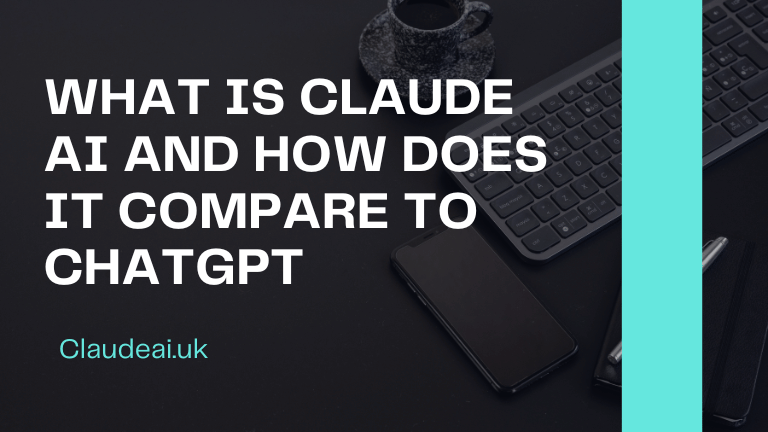What is Claude AI and How Does It Compare to ChatGPT? Artificial intelligence chatbots have exploded in capability and popularity over the past year. Two of the most talked about AI assistants are Claude AI and ChatGPT. But what exactly are these bots, and what sets them apart? This article will introduce Claude AI, explain how it works, and provide a detailed comparison to the more well-known ChatGPT.
What is Claude and How Was It Built?
Claude is an artificial intelligence assistant created in 2022 by Anthropic, a startup founded by former OpenAI and Google AI safety researchers. Claude was explicitly designed to be helpful, harmless, and honest using a technique called Constitutional AI.
Rather than training Claude based solely on absorbing human text patterns like other AI models, Anthropic took special care to train Claude to be aligned with human values. This technique, called Constitutional AI, is meant to make Claude more intent on being helpful without causing potential harms.
The key pillars of Claude’s Constitutional AI training are:
- Helpfulness – Optimized to provide useful information to users
- Honesty – Incentivized to admit the boundaries of its knowledge
- Harmlessness – Trained to avoid generating harmful, unethical, dangerous or illegal output
So in essence, Claude is an AI assistant created using advanced safety protocols to ensure it provides information carefully, while focusing on being helpful, harmless, and honest.
How Does Claude Compare to ChatGPT?
ChatGPT took the world by storm upon its release in November 2022 by OpenAI. This natural language AI chatbot also has exceptional capabilities for understanding requests and generating human-like responses. So how does Claude stack up against ChatGPT? Some key comparisons:
Safety – Claude AI has safety barriers built directly into its underlying models to avoid providing dangerous advice or presenting opinions as facts. ChatGPT does not have explicit safety or honesty protocols hard-coded into its models.
Accuracy – Claude will volunteer corrections, state upfront if it’s unsure, and label opinions versus facts. ChatGPT aims more for plausibility over accuracy which can sometimes lead to false information presented as truth.
Capabilities – Both have excellent language processing and text generation abilities, with ChatGPT very slightly ahead in some domains like articulating creative writing prompts. Claude may have an edge in accuracy for technical/scientific domains.
Development Strategy – Anthropic’s Constitutional AI approach focuses on transparency and safety, while OpenAI now relies more on sheer model scale and user feedback corrections. Each strategy has tradeoffs.
Accessibility – ChatGPT training was funded by $10 billion+ in venture capital, allowing free public usage to drive adoption. Claude was designed for enterprise clients first to sustain its expensive Constitutional AI training.
In summary, Claude prioritizes safety, accuracy, and transparency, while ChatGPT favors general conversational plausibility. For reliable question answering and advice delivery, Claude’s Constitutional AI foundations better living up to its motto of being helpful, harmless, and honest.
Example Use Cases and Conversations
Writing assistant:
Claude takes accuracy seriously when making factual statements or spelling a name. If unsure, Claude will either transparently say it doesn’t know, or attempt to provide the information while clearly labeling it as estimated or guessed.
ChatGPT has more natural language fluidity and therefore sounds a bit more human when writing. But it sometimes guesses or presents false information as factual statements due to its tendency to favor continuance of conversation over strict accuracy or transparency.

Information research:
Claude can summarize key details from health research papers with citations, carefully noting what statements are direct facts vs estimations. When asked for medical advice, Claude explains why it cannot ethically provide individual health recommendations the way a doctor could.
ChatGPT can discuss health topics as well, but is more prone to presenting opinions or estimations as facts without clarification. And without encoded safety barriers, ChatGPT will still attempt providing personal medical suggestions if asked – despite disclaimers that it cannot replace advice from a healthcare professional.
Productivity assistance:
Claude avoids tasks that could break laws or terms of service. If asked for help related to plagiarism, illegal activity or compromising passwords, Claude will apologize and transparently refuse assistance on ethical grounds.
Without explicit safety guardrails coded into its behavior, ChatGPT has been documented providing dangerous advice or attempting illegal activities. However, OpenAI is now retroactively implementing some content filtering system limitations to reduce harmful outputs.
Creative writing:
Both Claude and ChatGPT are talented creative assistants that can help brainstorm fictional stories or song lyrics with creative launching points. Claude focuses a bit more on plot logic and continuity due to its accuracy-orientation, while ChatGPT offers more free-flowing whimsical narrative directions filtered less through an accuracy lens.
Conclusion
In summary Claude AI and ChatGPT have complementary strengths and weaknesses. Claude favors safety, auditability, and transparency – but can occasionally come across slightly less smooth in conversational contexts. ChatGPT trades off some accuracy for more captivating language generation capability and persuasive conversational ability.
The choice between opting for Claude vs ChatGPT depends greatly on the intended use cases and if accuracy or engaging user experience is more important. But excitingly, this is just the beginning of a new generation of AI assistants epitomized by leaders like Claude and ChatGPT. The gap between these tools will likely continue closing rapidly – giving users an ever-expanding choice of how to tap into AI and automate tasks to boost their productivity and creativity.


